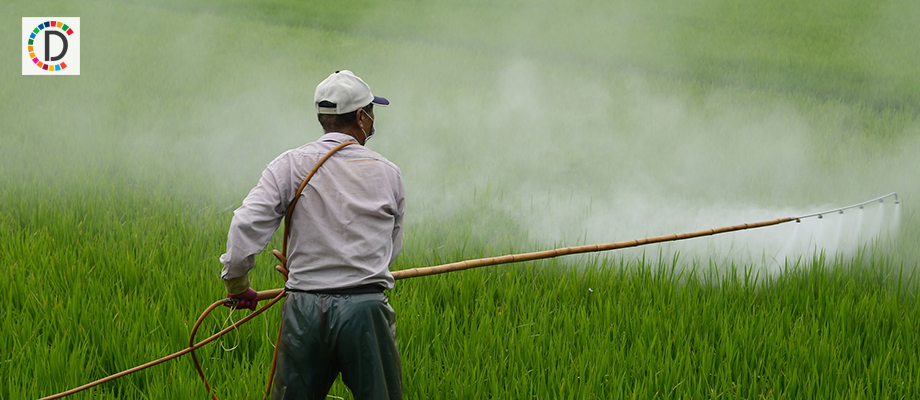Cabinet approves Rs 38,000 crore subsidy for P&K fertilisers for Kharif season
Earlier, we used to enter the global market only when required that led to fluctuations in the international prices, he said.Due to subsidy intervention, the Minister also shared that the retail prices of fertilisers in India are much lower when compared to other countries.

The Union Cabinet on Wednesday approved a subsidy of Rs 38,000 crore for Phosphatic and Potassic (P&K) fertilisers, taking the total outlay for fertiliser subsidies to Rs 1.08 lakh crore for the ongoing Kharif season in order to provide affordable soil nutrients to farmers.
The total amount includes Rs 70,000 crore earmarked for subsidy on urea in the 2023-24 Union Budget.
While announcing the Rs 38,000 crore subsidy, the government also said there will be no change in the Maximum Retail Price (MRP) of fertilisers.
The Kharif season is from April-September.
The government's subsidy burden on P&K fertlisers has come down for the ongoing Kharif season due to cooling down of global prices in the last few months.
For the entire 2023-24 fiscal, the fertiliser bill could reach up to Rs 2.25 lakh crore.
Briefing media, Fertiliser Minister Mansukh Mandaviya said the Cabinet has approved Nutrient-Based Subsidy (NBS) rates for P&K fertilisers for the 2023-24 Kharif season.
The Cabinet has given it snod for a subsidy of Rs 76 per kg for for Nitrogen (N), Rs 41 per kg for Phosphorus (P), Rs 15 per kg for Potash (K) and Rs 2.8 per kg for Sulphur (S), he said.
According to the minister, the subsidy has been reduced as global prices of NPK have come down in the last three months.
For instance, Di-ammonium Phosphate (DAP) prices in the international market have reduced to USD 530 per tonne from a high of USD 925 per tonne, he added.
''A total of Rs 1.08 lakh crore will be spent on fertiliser subsidy for the Kharif season (April-September),'' he said, and emphasised that there will be no change in the MRP of fertilisers.
For the October-March period of 2022-23, the government had fixed a subsidy of Rs 98.02 per kg for Nitrogen (N), Rs 66.93 per kg for Phosphorus (P), Rs 23.65 per kg for Potash (K) and Rs 6.12 per kg for Sulphur (S).
Under the NBS scheme, which is being implemented since April 2010, a fixed rate of subsidy is announced now on a biannual basis.
The per kilogram subsidy rates for N, P, K, and S are converted into per tonne subsidy on the various P&K fertilisers covered under the NBS policy. The government is making available fertilisers to farmers at subsidised prices through fertiliser manufacturers/importers.
Last year, the minister said the government had to increase the subsidy on P&K fertilisers due to a sharp increase in the global prices following the coronavirus pandemic and the Russia-Ukraine crisis. As a result, total fertiliser bill rose to Rs 2.54 lakh crore in 2022-23 fiscal.
''Global prices had increased, but we did not increase the MRP. We decided to raise the fertiliser subsidy to ensure farmers do not face any burden,'' he said.
The government had spent about Rs 8,909 subsidy on each hectare of cultivated land and Rs 21,233 subsidy on each farmer in the country, he added.
There are 12 crore farmers and 1,400 lakh hectare cultivable land in the country.
By increasing the subsidy, the minister said the government ensured the MRP of P&K fertilisers like DAP, and Muriate of Potash (MoP) were not raised. Presently, urea is being sold at Rs 276 per bag and DAP at Rs 1,350 per bag in the retail market.
Urea and DAP are the two widely consumed fertilisers in the country.
''However, global prices have cooled down in the last few months, easing the subsidy burden on the government.
''Total subsidy bill for the Kharif season will be Rs 1.08 lakh crore. For the entire (2023-24 fiscal) year, the total fertiliser subsidy can be above Rs 2 lakh crore and can be Rs 2.25 lakh crore,'' Mandaviya noted.
The minister said the government in the last nine years has ensured smooth supply of fertilisers by entering into long-term supply contracts with 13 countries like Canada and Saudi Arabia.
''For 70 per cent of our domestic fertiliser requirement, India has a long term contract with 13 countries. Earlier, we used to enter the global market only when required that led to fluctuations in the international prices,'' he said.
Due to subsidy intervention, the Minister also shared that the retail prices of fertilisers in India are much lower when compared to other countries.
(This story has not been edited by Devdiscourse staff and is auto-generated from a syndicated feed.)










